
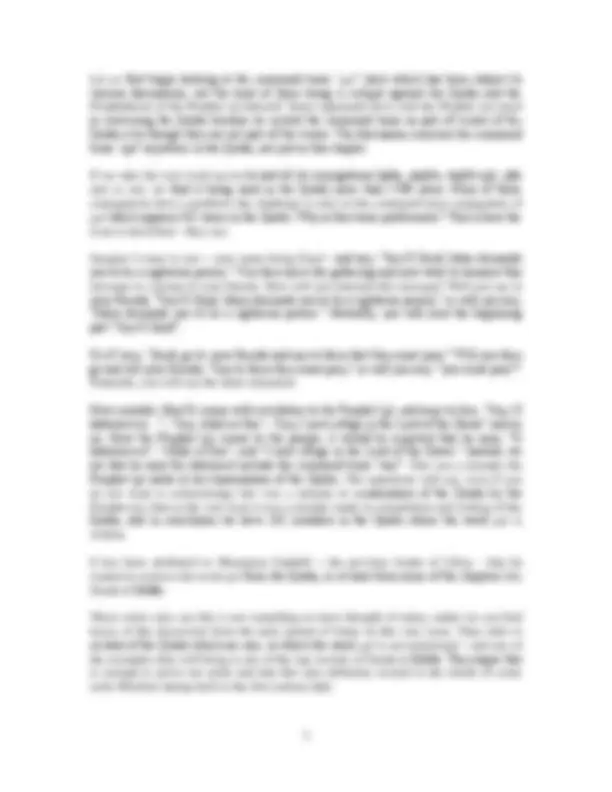
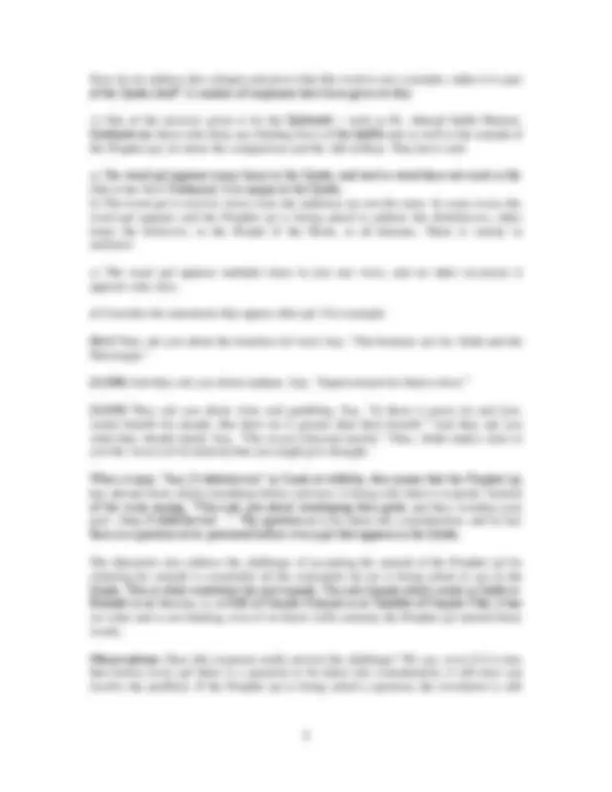
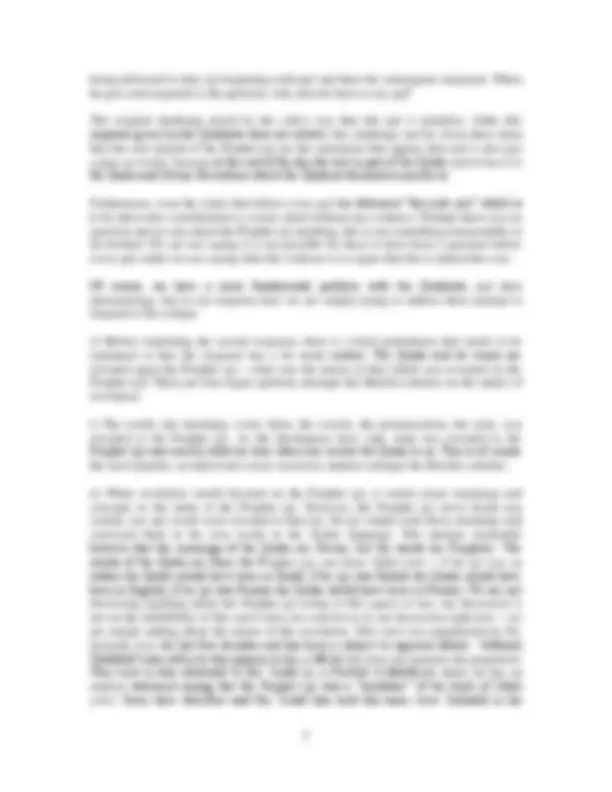
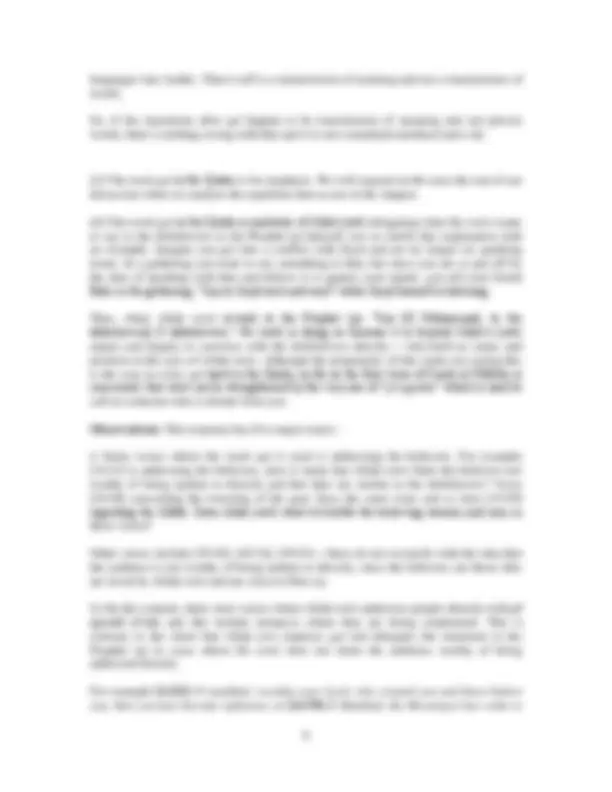
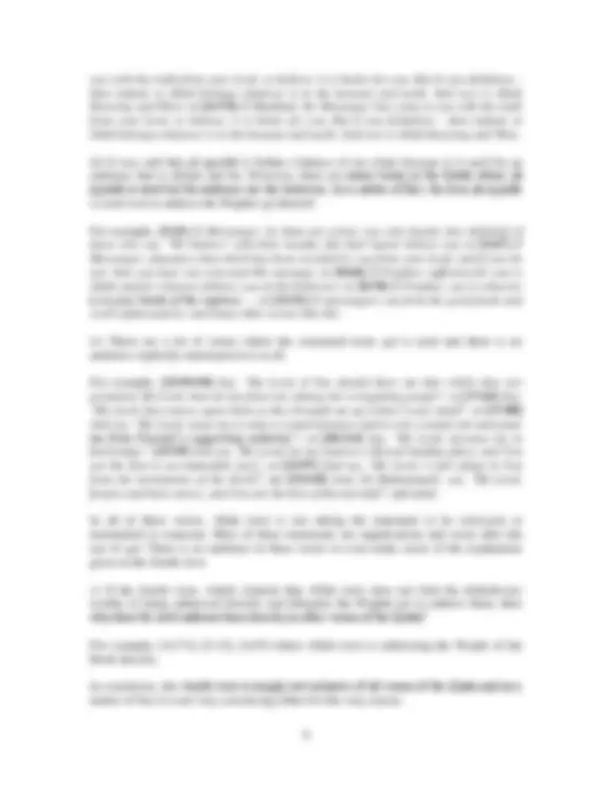
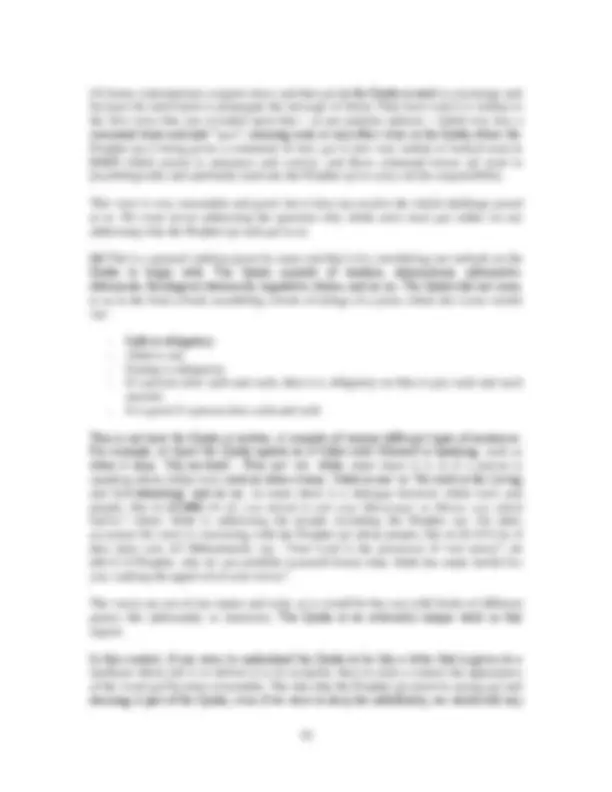

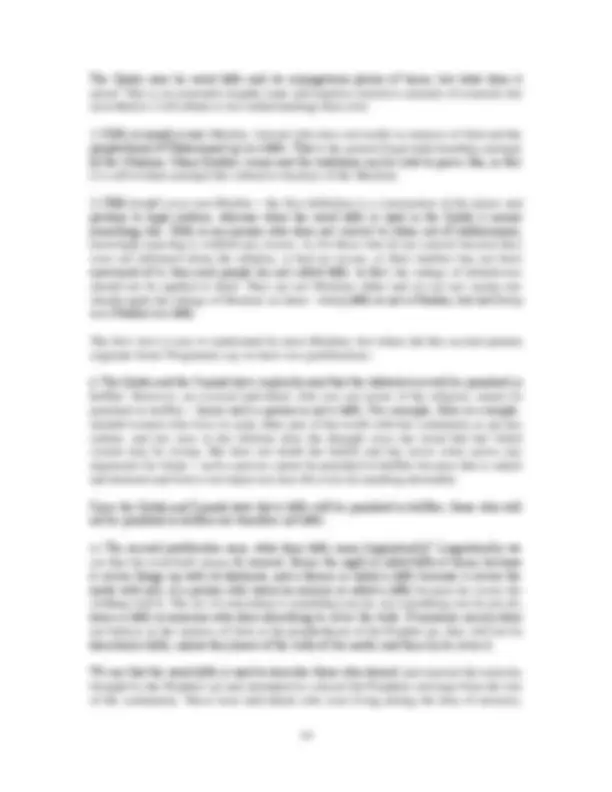
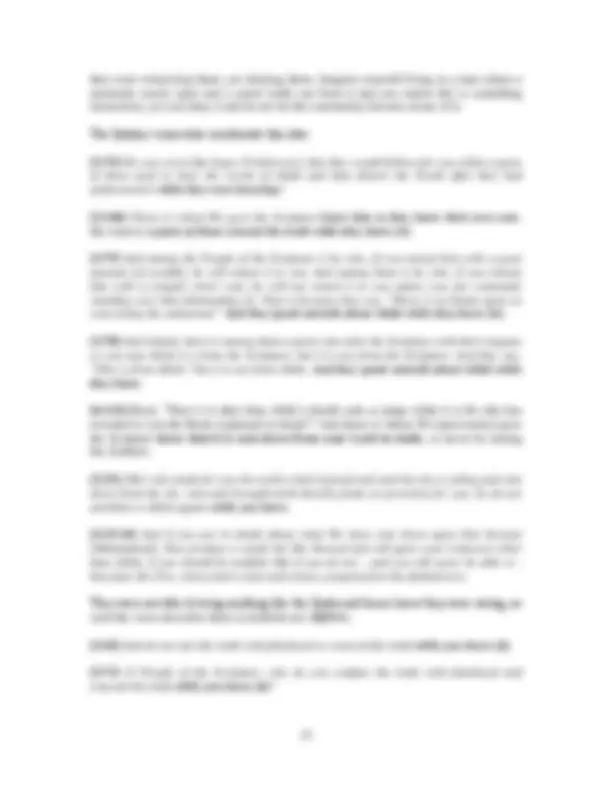
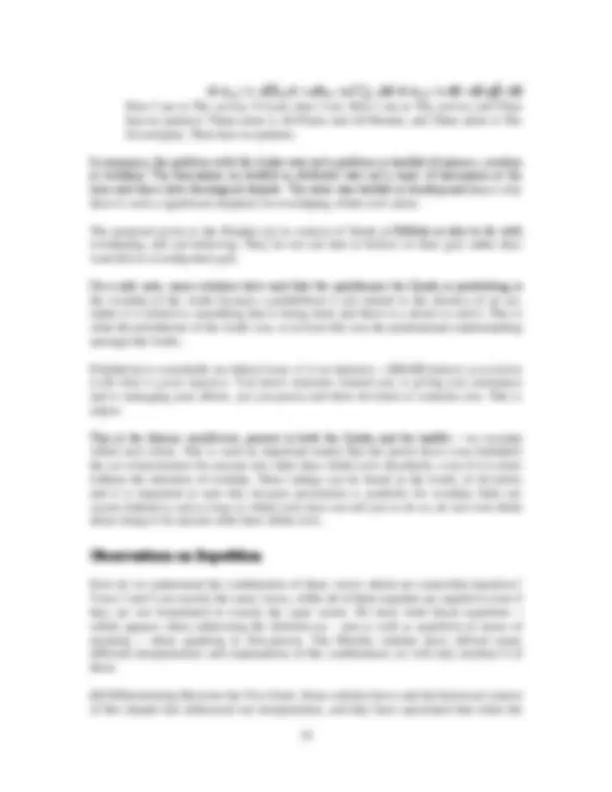
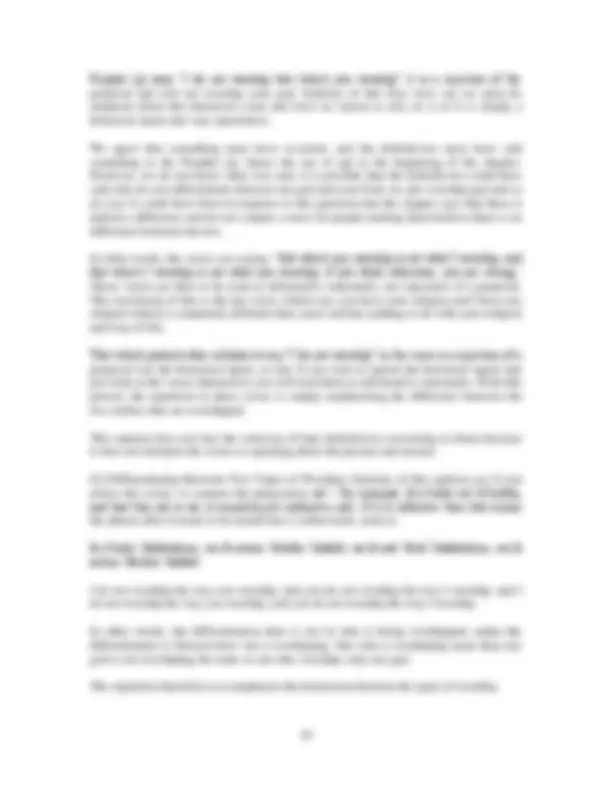
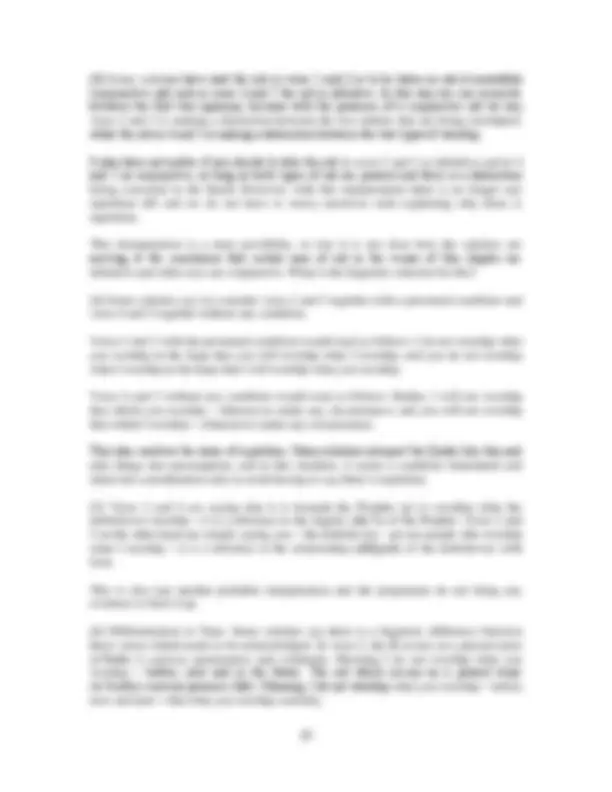
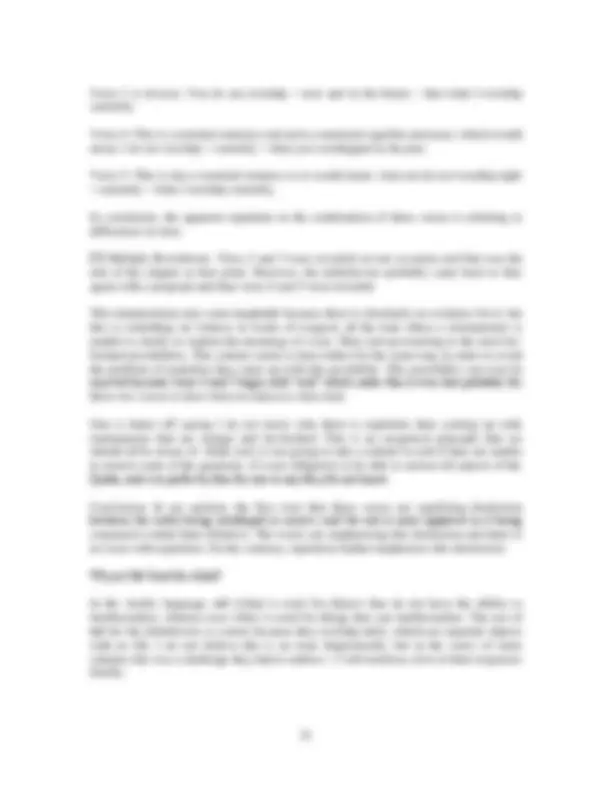

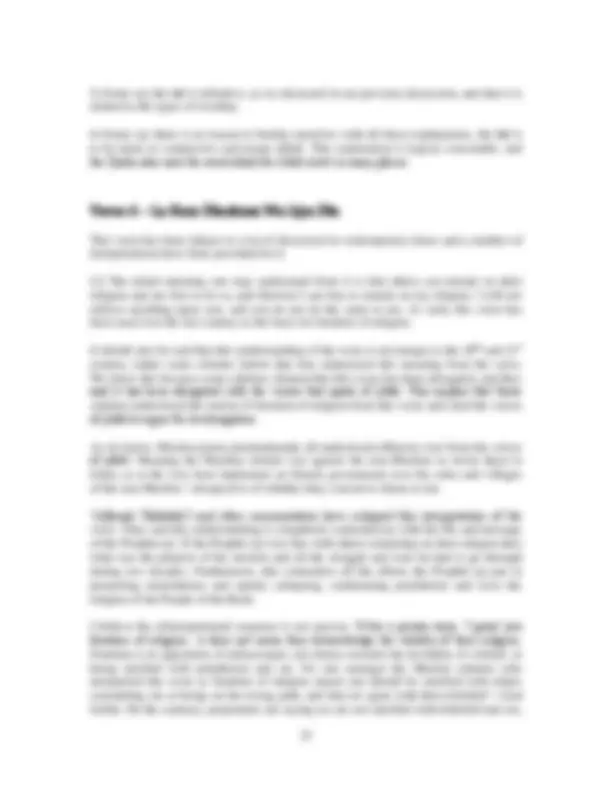
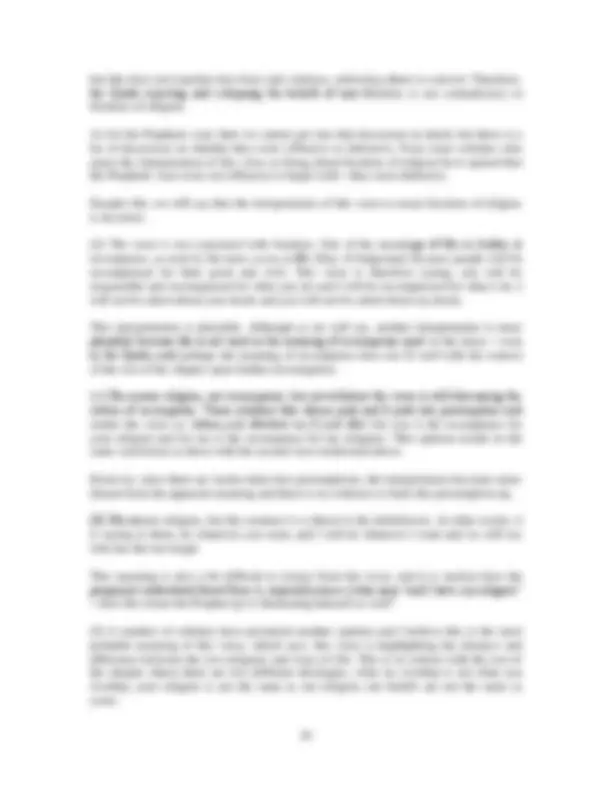
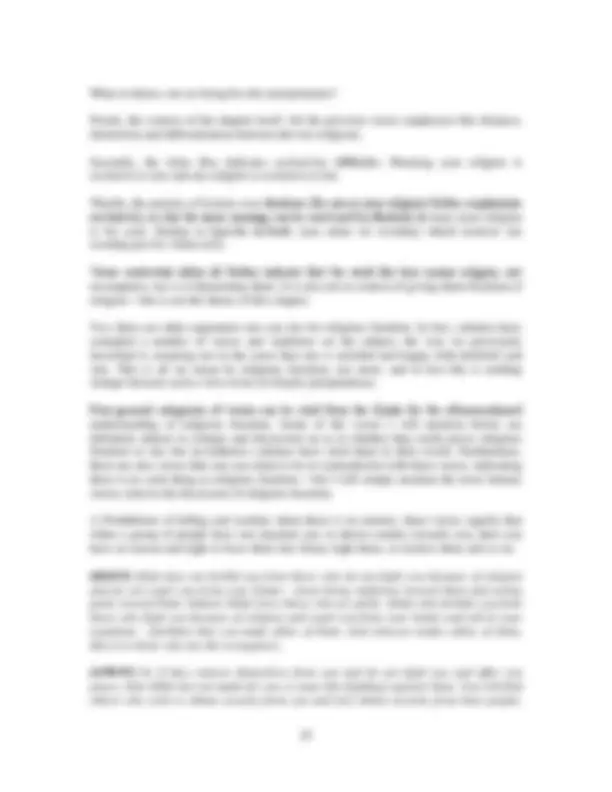
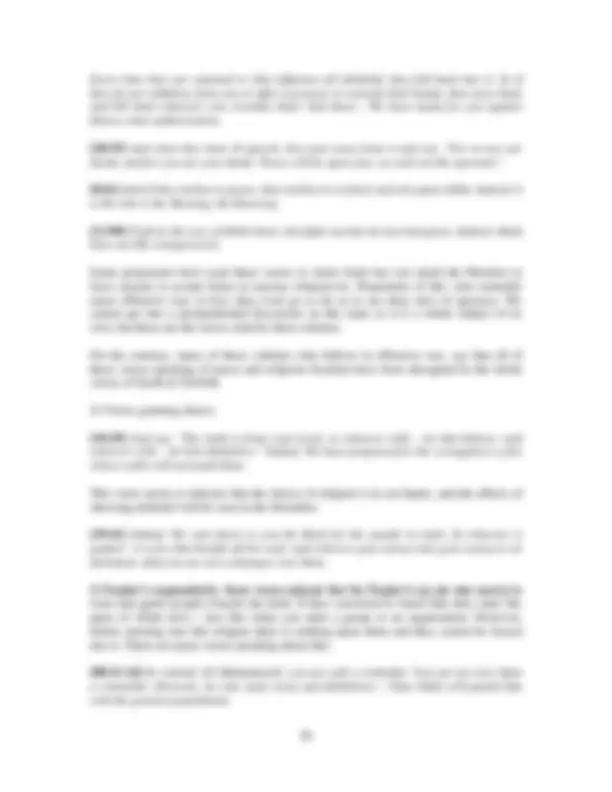
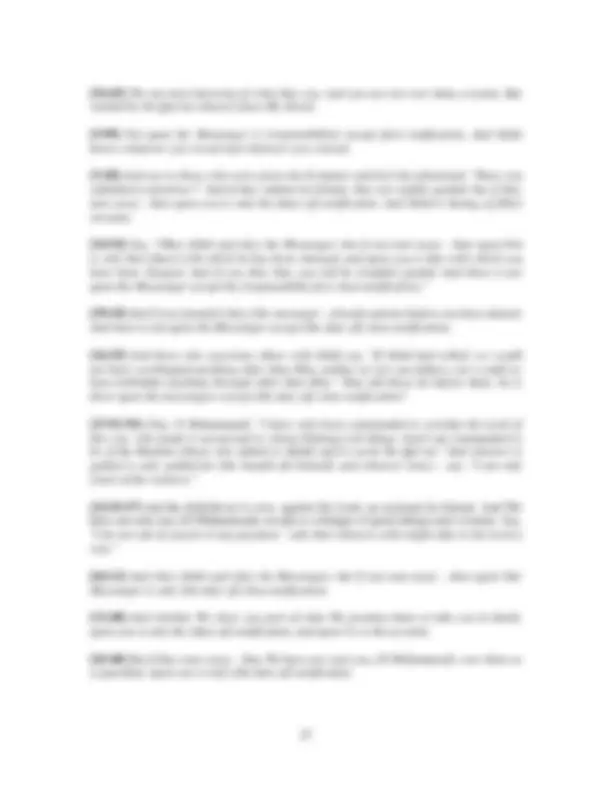
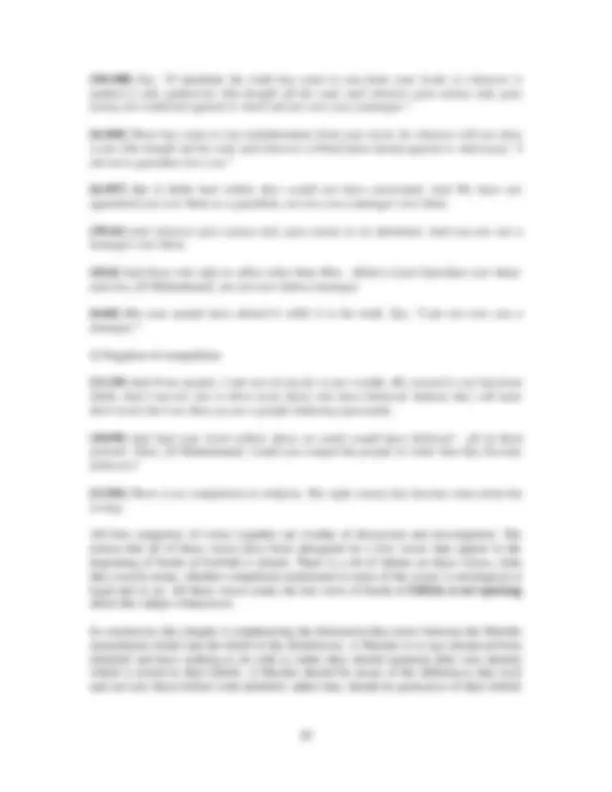



Study with the several resources on Docsity

Earn points by helping other students or get them with a premium plan


Prepare for your exams
Study with the several resources on Docsity

Earn points to download
Earn points by helping other students or get them with a premium plan
Community
Ask the community for help and clear up your study doubts
Discover the best universities in your country according to Docsity users
Free resources
Download our free guides on studying techniques, anxiety management strategies, and thesis advice from Docsity tutors
Say, "The excess [beyond needs]." Thus, Allah makes clear to you the verses [of revelation] that you might give thought. When it says, “Say, O disbelievers” in ...
Typology: Lecture notes
1 / 29

This page cannot be seen from the preview
Don't miss anything!






















The chapter has been referred to in three ways in Islamic works:
A group of disbelievers in Makkah, including al-Ḥārith b. Qays al-Sahmī, al-‘Āṣ b. Wā’il, al-Walīd b. Mughīrah, Umayyah b. Khalaf and others, came to the Prophet (p) and said to him, why do you not worship what we worship, and we will worship what you worship for a time period, after which we will see whose god and worship is better, who sees the results of their worship soon after. If your god and worship are better then that will be a moment of pride for the Quraysh and we will take a share of it, but if you (p) find that our gods and worship are better then you shall take a share of it. As per historical reports, the Prophet (p) rejected their offer. This chapter was revealed and the Prophet (p) left the Masjid al-Ḥarām and recited it in front of the people.
This is the popular report describing the reasons for the chapter’s revelation, both in Sunnī and Shī’ī texts, the latter works including traditions from the Ahl al-Bayt (a) as well.
As per the contents of its verses only, there is nothing by which we can argue it is Makkī or Medanī, but as per historical reports on its reasons for revelation, the popular view has been that it is Makkī, and this is what is more probably and likely.
As far as merits of the chapter are concerned, some reports say this chapter equals one- fourth of the Qurān. Some reports encourage its recitation before sleeping in order for a person to remain protected from polytheism.
This chapter is also discussed in jurisprudential discussions. The jurists opine – although some have given the verdict of obligatory precaution – that once a person begins reciting a chapter in the Ṣalāt, there are three scenarios:
They have not finished half of the chapter yet. For example, if you are reciting Surah al-Ḍuḥa, before reaching the half-way point, you decide to change the Surah and read another one, it is allowed.
They have finished half of it, but not one-third of it yet. Over here, jurists say you are not allowed to change the Surah.
Though there are some differences of opinions on the aforementioned scenarios, but we are not concerned with them at the moment. The point is that the jurists say there are two Surahs that once you begin reading them, even if you are only on the first verse, you are not allowed to change it. Those two Surahs are Surah al-Kāfirūn and al-Ikhlāṣ. This is the popular opinion amongst the jurists. The only exception some jurists make is for Ṣalāt al- Jumu’ah or the Ẓuhr prayers on Friday, given you had intended to recite Surah al- Jumu’ah in your prayers, but you forgot, then in that case you can even abandon these two Surahs and change to Surah al-Jumu’ah.
Before beginning the actual commentary, we want to discuss the general theme of this chapter. The popular opinion amongst scholars and what you will find in the works of Muslim scholars is that its theme is rejection and distancing (barā’ah and mufāṣalah) – meaning we do not accept any other religion, nor believe it, nor lean towards it – belief does not mix with disbelief. Therefore, the chapter was also called qashqasha and the historical report describing its reasons for revelation also corroborate this theme.
On the other hand, some scholars over the last century have argued that the theme of this chapter concerns freedom and religious plurality. This chapter indicates that all sides are free to follow their religion, you have your own religion that you are allowed to follow, and we have our own religion, each of us follow our own path.
These are two perspectives on this chapter and over the course of our commentary we will evaluate which of these perspectives is correct: rejection and distancing from polytheism and disbelief, or granting legitimacy and recognition to polytheism and disbelief.
How do we address this critique and prove that this word is not a mistake, rather it is part of the Qurān itself? A number of responses have been given to this:
a) The word qul appears many times in the Qurān, and such a word does not exist in the Old or the New Testament. It is unique to the Qurān. b) The word qul is used in verses were the audience are not the same. In some verses the word qul appears and the Prophet (p) is being asked to address the disbelievers, other times the believers, or the People of the Book, or all humans. There is variety in audience.
c) The word qul appears multiple times in just one verse, and on other occasions it appears only once.
d) Consider the statements that appear after qul. For example:
[8:1] They ask you about the bounties [of war]. Say, "The bounties are for Allah and the Messenger."
[2:220] And they ask you about orphans. Say, "Improvement for them is best.”
[2:219] They ask you about wine and gambling. Say, "In them is great sin and [yet, some] benefit for people. But their sin is greater than their benefit.” And they ask you what they should spend. Say, "The excess [beyond needs]." Thus, Allah makes clear to you the verses [of revelation] that you might give thought.
When it says, “Say, O disbelievers” in Surah al-Kāfirūn, this means that the Prophet (p) has already been asked something before and now is being told what to respond. Instead of the verse saying, “They ask you about worshiping their gods and they worship your god – Say, O disbelievers…”. The question is to be taken into consideration, and in fact there is a question to be presumed before every qul that appears in the Qurān.
The Quranists also address the challenge of accepting the sunnah of the Prophet (p) by claiming his sunnah is essentially all the statements he (p) is being asked to say in the Qurān. This is what constitutes his oral sunnah. The oral sunnah which exists in Ṣaḥīh al- Bukhārī or al-Muslim, or al-Kāfī of Shaykh Kulaynī or al-Tahdhīb of Shaykh Ṭūṣī, it has on value and is not binding, even if we know with certainty the Prophet (p) uttered those words.
Observations: Does this response really answer the challenge? We say, even if it is true that before every qul there is a question to be taken into consideration, it still does not resolve the problem. If the Prophet (p) is being asked a question, the revelation is still
being delivered to him (p) beginning with qul and then the subsequent statement. When he goes and responds to the question, why does he have to say qul?
The original challenge posed by the critics was that this qul is pointless, while this response given by the Qurānists does not resolve this challenge one bit. Even their claim that the oral sunnah of the Prophet (p) are the statements that appear after qul is also just a play on words, because at the end of the day the text is part of the Qurān and in fact it is the Qurān and Divine Revelation which the Qurānist themselves ascribe to.
Furthermore, even the claim that before every qul the statement “they ask you” which is to be taken into consideration is a mere claim without any evidence. Perhaps there was no question and no one asked the Prophet (p) anything, this is not something unreasonable or far-fetched. We are not saying it is not possible for there to have been a question before every qul, rather we are saying what the evidence is to argue that this is indeed the case.
Of course, we have a more fundamental problem with the Qurānists and their epistemology, but in our response here we are simply trying to address their attempt to respond to the critique.
i) The words, the meanings, every letter, the vowels, the pronunciation, the style, was revealed to the Prophet (p). As the theologians have said, what was revealed to the Prophet (p) was exactly what we hear when one recites the Qurān to us. This is of course the most popular, accepted and a near consensus opinion amongst the Muslim scholars.
ii) When revelation would descend on the Prophet (p), it would create meanings and concepts in the mind of the Prophet (p). However, the Prophet (p) never heard any sounds, nor any words were revealed to him (p). He (p) simply took those meanings and conveyed them in his own words in the Arabic language. This opinion essentially believes that the meanings of the Qurān are Divine, but the words are Prophetic. The words of the Qurān are from the Prophet (p), not from Allah (swt) – if he (p) was an Indian the Qurān would have been in Hindī, if he (p) was British the Qurān would have been in English, if he (p) was Persian the Qurān would have been in Persian. We are not discussing anything about the Prophet (p) erring in this aspect or not, our discussion is not on the infallibility of this and it does not concern us in our discussion right now – we are simply talking about the nature of this revelation. This view was popularized by Dr. Soroush over the last few decades and has been a subject to rigorous debate. ‘Allāmah Ṭabāṭabā’ī also refers to this opinion in his al-Mīzān but does not mention the proponent. This view is also attributed to Ibn ‘Arabī in al-Futūḥāt al-Makkīyah where he has an explicit statement saying that the Prophet (p) was a “translator” of the book of Allah (swt). Some have therefore said Ibn ‘Arabī also held this same view. Zarkashī in his
being transferred, hence why the scholars of ḥadīth all allowed naql bil ma’na , rather we have traditions allowing it as long as it does not alter the meaning.
If the Prophet (p) constructed a statement after qul which conveyed the meanings revealed to him with the best precision possible, this would not be considered a lie, and neither would he be considered untrustworthy.
Secondly, if indeed transmission through meaning was deemed a lie and unethical, then what would they say about the Qurān doing this when quoting individuals on multiple occasions. Consider the example of Prophet Musa (a):
إِنِي آنَسْت ُ نَارًا سَآتِيكُم مِنْهَا بِخَبَر ٍ أَو ْ آتِيكُم بِشِهَاب ٍ قَبَس ٍ لَّعَلَّكُم ْ تَصْطَلُون َ ٰ ِلَِهْلِهِ إِذ ْ قَال َ مُوسَى
[27:7] When Moses said to his family, "Indeed, I have perceived a fire. I will bring you from there information or will bring you a burning torch that you may warm yourselves."
]82:82 [ And when Moses had completed the term and was traveling with his family, he perceived from the direction of the mount a fire. He said to his family, "Stay here; indeed, I have perceived a fire. Perhaps I will bring you from there [some] information or burning wood from the fire that you may warm yourselves."
Both of these verses are referring to the same incident and quoting Musa (a), yet the statements are both different. Will we now say that the Qurān cannot be trusted in what Musa (a) really said to his family in one of these verses? In other places of the Qurān where this occurs, some resorted to saying that the individual uttered these statements two different times on two different occasions.
There is a third instance in the Qurān where it says:
امْكُثُوا إِنِي آنَسْت ُ نَارًا لَّعَلِي آتِيكُم مِنْهَا بِقَبَس ٍ أَو ْ أَجِد ُ عَلَى النَّار ِ هُدًى َ ِلَِهْلِهِ وَهَل ْ أَتَاك َ حَدِيث ُ مُوسَى ٰ إِذ ْ رَأَى ٰ نَارًا فَقَال
[20:9-10] And has the story of Moses reached you? - When he saw a fire and said to his family, "Stay here; indeed, I have perceived a fire; perhaps I can bring you a torch or find at the fire some guidance."
This third quotation is even more different, but in all three verses the general meaning of what Musa (a) originally must have said has been conveyed to us.
Thirdly, even if we were to ignore our observations below, we will still ask, did the Prophets – Ibrahim, Hud, Adam, Nuh and so on – speak Arabic? They spoke very different languages, albeit Semitic, and the Qurān is translating what they said in their
languages into Arabic. That it self is a transmission of meaning and not a transmission of words.
So, if the statements after qul happen to be transmission of meaning and not precise words, there is nothing wrong with that and it is not considered unethical and a lie.
[3] The word qul in the Qurān is for emphasis. We will expand on this near the end of our discussion when we analyze the repetition that occurs in the chapter.
[4] The word qul in the Qurān is symbolic of Allah (swt) delegating what He (swt) wants to say to the disbelievers to the Prophet (p) himself. Let us clarify this explanation with an example: imagine you get into a conflict with Zayd and are no longer on speaking terms. In a gathering you want to say something to him, but since you are so put off by the idea of speaking with him and believe it is against your repute, you tell your friend Bakr in the gathering, “Say to Zayd such and such” while Zayd himself is listening.
Thus, when Allah (swt) reveals to the Prophet (p), “Say [O Muhammad, to the disbelievers] O disbelievers,” He (swt) is doing so because it is beyond Allah’s (swt) repute and dignity to converse with the disbelievers directly – who hold no status and position in the eyes of Allah (swt). Although the proponents of this claim are saying this is the case in every qul used in the Qurān, as far as the first verse of Surah al-Kāfirūn is concerned, this view can be strengthened by the very use of “ yā ayyuha ” which is used to call on someone who is distant from you.
Observations: This response has five major issues:
i) Some verses where the word qul is used is addressing the believers. For example [14:31] is addressing the believers, does it mean that Allah (swt) finds the believers not worthy of being spoken to directly and that they are similar to the disbelievers? Verse [24:30] concerning the lowering of the gaze faces the same issue and so does [33:59] regarding the Jilbāb. Does Allah (swt) want to belittle the believing women and men in these verses?
Other verses include [39:10], [45:14], [39:53] – these do not reconcile with the idea that the audience is not worthy of being spoken to directly, since the believers are those who are loved by Allah (swt) and are close to Him (a).
ii) On the contrary, there were verses where Allah (swt) addresses people directly with yā ayyuhā al-nās and this include instances where they are being condemned. This is contrary to the claim that Allah (sw) employs qul and delegates the statement to the Prophet (p) in cases where He (swt) does not deem the audience worthy of being addressed directly.
For example [2:221] O mankind, worship your Lord, who created you and those before you, that you may become righteous ; or [4:170] O Mankind, the Messenger has come to
[5] Some contemporary exegetes have said that qul in the Qurān is used to encourage and increase his motivation to propagate the message of Islam. They have said it is similar to the first verse that was revealed upon him – as per popular opinion – which was also a command tense and said “ iqra ”, meaning read, or any other verse in the Qurān where the Prophet (p) is being given a command. In fact, qul is also very similar to balligh used in [5:67] which means to announce and convey, and these command tenses are used to psychologically and spiritually motivate the Prophet (p) to carry out his responsibility.
This view is very reasonable and good, but it does not resolve the initial challenge posed at us. We were never addressing the question why Allah (swt) used qul , rather we are addressing why the Prophet (p) said qul to us.
[6] This is a general solution given by some and that is by considering our outlook on the Qurān to begin with. The Qurān consists of wisdom, admonitions, informative statements, theological statements, legislative duties, and so on. The Qurān did not come to us in the form a book resembling a book of rulings of a jurist, where the verses would say:
This is not how the Qurān is written; it consists of various different types of sentences. For example, at times the Qurān speaks as if Allah (swt) Himself is speaking, such as when it says, ‘My servants’, ‘Fear me’ etc. while other times it is as if a person is speaking about Allah (swt), such as when it says, ‘Allah is one’ or ‘He (swt) is the Living and Self-subsisting’ and so on. At times there is a dialogue between Allah (swt) and people, like in [2:108] Or do you intend to ask your Messenger as Moses was asked before? where Allah is addressing the people excluding the Prophet (p). On other occasions He (swt) is conversing with the Prophet (p) about people, like in [6:147] So if they deny you, [O Muhammad], say, "Your Lord is the possessor of vast mercy”; or [66:1] O Prophet, why do you prohibit [yourself from] what Allah has made lawful for you, seeking the approval of your wives?
The verses are not of one nature and style, as is would be the case with books of different genres like philosophy or chemistry. The Qurān is an extremely unique work in this regard.
In this context, if one were to understand the Qurān to be like a letter that is given to a mailman whose job is to deliver it to its recipient, then in such a context the appearance of the word qul becomes reasonable. The idea that the Prophet (p) erred in saying qul and deeming it part of the Qurān, even if we were to deny the infallibility, we would still say
the mistake and error could have occurred once or twice, or at most three times, but eventually Allah (swt) would and should have informed the Prophet (p) to not consider qul as part of the Qurān. Or else you would have to acknowledge that the Prophet (p) erred more than 300 times in the Qurān over the course of two decades by deeming qul as part of the text of the Qurān and Allah (swt) did not interfere even once and correct him (p). In addition, we also do not find the word qul in the beginning of every chapter, or the beginning of a collection of verses that were revealed together or verses revealed independently, even though it is presumed that the Prophet (p) would have been commanded to recite these verses to people.
Hence, we have to acknowledge that qul is simply just one of various different styles employed through out the Qurān, at times it is addressing the Prophet (p), at times addressing people excluding the Prophet (p), at times speaking about Allah (swt) in third person, at times addressing Allah (swt) directly, at times it is a dialogue, and so on. When the word qul is employed in the Qurān it conveys that the Prophet (p) is simply a messenger, what he (p) is saying is not something from himself, rather it is from Allah, he (p) is a mere messenger.
As a disclaimer we want to say, we are not saying this is the most definite and correct answer. In order to refute the initial challenge posed by the critics, all we need to do is present a reasonable justification explaining the benefit of qul in the Qurān, after which the critique can be nullified - that suffices for us.
What we discussed previously was concerning the qul as it appears in the Qurān anywhere. However, there is also an interpretative discussion concerning why qul appears in this chapter specifically. There are three major opinions:
This explanation is of course plausible.
This explanation is also plausible and has been mentioned by scholars.
What does the alif-lām used on the word kāfir in this specific chapter? There are two possibilities:
The alif-lām appears on the plural of kāfir, which indicates all disbelievers, living at all times, all places, of all races, backgrounds and political affiliations.
It refers to the specific group of disbelievers who presented the Prophet (p) with their proposal. One can generalize the message of the chapter to all disbelievers if you can, but the word al-kāfirūn in this chapter is specifically referring to those handful of individuals.
Why is this question even important? This question arose because of the subsequent verses that some scholars understood as implying that the Prophet (p) never did, and never will worship the gods of the disbelievers, and that the disbelievers never did, and never will worship and submit to Islam. If this is true, then the first meaning of alif-lām does not hold true because many disbelievers, even during the lifetime of the Prophet (p) converted to Islam and worshipped Allah (swt).
Therefore, it is necessary to restrict the number of disbelievers intended in this chapter so that it reconciles with historical facts. Those few individuals who put forth that proposal for the Prophet (p) had never worshipped one God and neither did they ever convert. In one sense, this chapter is also giving information about the unseen.
We believe the first opinion is more correct and we will respond to the second explanation later when we discuss the combination of the four subsequent verses of the chapter.
Why does the chapter address them as kāfirūn and not as people who came with a proposal for the Prophet (p), or simply O people, or O Quraysh, or O polytheists (al- mushrikūn)? We can conceive of two possibilities here:
The word al-kāfirūn is a term employed to convey condemnation.
The individuals are described as al-kāfirūn, because this description relays a causal relation between what is being said to them and what they are being described as. Meaning, the reason why I do not want to accept your proposal and I will distance myself from you, is because you are a kāfir. Kufr (disbelief) is the reason for the Prophet’s (p) rejection.
The Qurān uses he word kāfir and its conjugations plenty of times, but what does it mean? This is an extremely lengthy topic and requires extensive amounts of research, but nevertheless I will allude to two understandings that exist:
Kāfir is simply a non-Muslim. Anyone who does not testify to oneness of God and the prophethood of Muhammad (p) is a kāfir. This is the general legal understanding amongst all the Muslims. Many Qurānic verses and the traditions can be cited to prove this, in fact it is self-evident amongst the collective memory of the Muslims.
Kāfir is not every non-Muslim – the first definition is a construction of the jurists and pertains to legal matters, whereas when the word kāfir is used in the Qurān it means something else. Kāfir is any person who does not convert to Islam out of stubbornness, knowingly rejecting it, without any excuse. As for those who do not convert because they were not informed about the religion, or had an excuse, or their intellect has not been convinced of it, then such people are not called kāfir. In fact, the rulings of disbelievers should not be applied to them. They are not Muslims either and we are not saying one should apply the rulings of Muslims on them – every kāfir is not a Muslim, but not every non-Muslim is a kāfir.
The first view is easy to understand by most Muslims, but where did this second opinion originate from? Proponents say we have two justifications:
i) The Qurān and the Sunnah have explicitly said that the disbelievers will be punished in hellfire. However, an excused individual, who was not aware of the religion, cannot be punished in hellfire – hence such a person is not a kāfir. For example, there is a simple- minded woman who lives in some other part of the world with her community as per her culture, and not once in her lifetime does the thought cross her mind that her belief system may be wrong. She does not doubt her beliefs and has never come across any arguments for Islam – such a person cannot be punished in hellfire because that is unjust and detested and God is not unjust nor does He (swt) do anything detestable.
Since the Qurān and Sunnah state that a kāfir will be punished in hellfire, those who will not be punished in hellfire are therefore not kāfir.
ii) The second justification says, what does kāfir mean linguistically? Linguistically we see that the word kufr means to conceal. Hence the night is called kāfir at times, because it covers things up with its darkness, and a farmer is called a kāfir because it covers the seeds with soil, or a person who wears an armour is called a kāfir because he covers his clothing with it. The act of concealing is something you do, not something you do not do, hence a kāfir is someone who does something to cover the truth. If someone merely does not believe in the oneness of God or the prophethood of the Prophet (p), they will not be described a kāfir, unless they know of the truth of the matter and then try to cover it.
We see that the word kāfir is used to describe those who denied and rejected the miracles brought by the Prophets (p) and attempted to conceal the Prophetic message from the rest of the community. These were individuals who were living during the time of miracles,
[61:5] And when Moses said to his people, "O my people, why do you harm me while you certainly know that I am the messenger of Allah to you ?"
When you look at all these verses and others, it seems apparent that the Qurān refers to those as kāfir who knew of the truth and then concealed it, and rejected it. However, as I said, this is a very extensive topic and requires many lessons, but I just wanted to shed some light on it.
We know all the Prophets (p) brought the message of monotheism (tawḥīd), and this monotheism is not just an article of belief, rather it is a complete worldview as emphasized by ‘Allāmah Ṭabāṭabā’ī. We know tawḥīd has a lot of different meanings, most famous of them being:
Tawḥīḍ in Essence – that Allah in His very Essence is one, single, has no partner, is not compound of multiple parts, has nothing that resembles him.
Tawḥīḍ in Attributes – meaning Allah’s (swt) attributes are part of His (swt) Essence, although this has always been a debate amongst the different factions of Islam.
Tawḥīḍ in Creation – no one has created this existence except Allah (swt).
Tawḥīḍ in Lordship – there is no one taking care of the affairs of this world except Allah (swt). This is in opposition to those who believed in delegation (tafwīḍ), that Allah (swt) has created the universe, and has left it run on its own.
Tawḥīḍ in Worship – meaning no one is worthy to be worshipped, and no one should be worshipped, except Allah (swt). There should be sincerity in worship. This is in opposition to either worshipping some other entity or worshipping Allah (swt) alongside another entity – both of these are polytheism and contrary to monotheism.
This is what the Muslim theologians have expounded on in detail. The question that needs to be asked is, which type of tawḥīd did not exist amongst the Arabs? Did the Arabs deny tawḥid in God’s essence, attributes, creation, lordship, or worship?
According to the Qurān the Arabs believed in Allah (swt). The atheism which we witness today in the world was very rare in the Arab society. The idea that there is no Allah (swt) or no god at all did not exist amongst the Arabs and in fact the Qurān does not address the phenomenon of atheism at all. The Arabs not only believed in Allah (swt), they also believed in tawḥīd in His (swt) creation and lordship. The Arabs had a problem in worship, as they would primarily worship the idol by the name of Hubal alongside some other idols. Their prayers, devotions and sacrifices were for these idols.
It is extremely important for us to study the theology of the Arabs before Islam and during the time period the Qurān was being revealed so that we know what exactly was it that the Qurān was addressing and critiquing. For example, [29:61] If you asked them, "Who created the heavens and earth and subjected the sun and the moon?" they would surely say, " Allah." Then how are they deluded?
The Arabs professed that Allah (swt) created them, He is the Lord running the affairs of the world, but they would thank and devote their worships for Hubal.
[29:63] And if you asked them, "Who sends down rain from the sky and gives life thereby to the earth after its lifelessness?" they would surely say "Allah." Say, "Praise to Allah "; but most of them do not reason.
The Qurān is telling them they should be thanking Allah (swt) especially given they know He (swt) is the one sending down the rain from the skies, but they are so naïve and simple minded that they thank someone else instead.
[31:25] And if you asked them, "Who created the heavens and earth?" they would surely say, "Allah." Say, "[All] praise is [due] to Allah"; but most of them do not know.
[43:9] And if you should ask them, "Who has created the heavens and the earth?" they would surely say, "They were created by the Exalted in Might, the Knowing."
[43:87] And if you asked them who created them, they would surely say, " Allah." So how are they deluded?
[10:31] Say, "Who provides for you from the heaven and the earth? Or who controls hearing and sight and who brings the living out of the dead and brings the dead out of the living and who arranges [every] matter?" They will say, "Allah," so say, "Then will you not fear Him?"
There are other verses, but all of these verses show that they believed Allah (swt) created them, He is the Lord. The Qurān is challenging them on their worship, they did not worship Allah (swt).
Even if you look at the talbīyah that the Arabs would recite, these have been reported in works of history, the ḥadīth and even the ḥadīth of the Ahl al-Bayt (a), this idea becomes very clear. Some of the Arabs would recite:
اللَّهُم َّ لَبَّيْك َ ، لَبَّيْك َ ال شَرِيك َ إِال شَرِيكًا هُو َ لَك َ تَمْلِكُه ُ وَمَا مَلَكَلَبَّيْكَ
Here I am O Allah, Here I am! Here I am! Thou hast no partner except a partner which belongs to Thee, and Thou possesses him and all that is his.
This talbīyah was changed, and if you look at the talbīya of the Muslims today you will see that it focuses specifically on praise and gratefulness being restricted for Allah (swt):
Prophet (p) says “I do not worship that which you worship” it is a rejection of the proposal and will not worship your god. Scholars of this first view say we must be skeptical about this historical event and have no reason to rely on it as it is simply a historical report and very speculative.
We agree that something must have occurred, and the disbelievers must have said something to the Prophet (p), hence the use of qul at the beginning of the chapter. However, we do not know what was said, it is possible that the disbelievers could have said why do you differentiate between our god and your God, we also worship god and so do you. It could have been in response to this question that the chapter says that there is indeed a difference and do not conjure a story for people making them believe there is no difference between the two.
In other words, the verses are saying: ‘that which you worship is not what I worship, and that which I worship is not what you worship, if you think otherwise, you are wrong.’ These verses are then to be read as informative statements, not rejections of a proposal. The conclusion of this is the last verse, which says you have your religion and I have my religion which is completely different than yours and has nothing to do with your religion and way of life.
That which pushed other scholars to say “I do not worship” in the verse is a rejection of a proposal was the historical report, or else if you were to ignore the historical report and just look at the verses themselves you will read them as informative statements. With this pretext, the repetition in these verses is simply emphasizing the difference between the two entities that are worshipped.
This opinion does not face the criticism of later disbelievers converting to Islam because it does not interpret the verses as speaking about the present and unseen.
[2] Differentiating Between Two Types of Worship: Scholars of this opinion say if you notice the verses, it contains the preposition mā – for example, lā a’budu mā ta’budūn, and that this mā is mā al-maṣdarīyyah (infinitive mā). If it is infinitive then that means the phrase after it needs to be turned into a verbal noun, such as:
lā a’budu ‘ibādatakum, wa lā antum ‘ābidūn ‘ibādatī, wa lā anā ‘ābid ‘ibādatakum, wa lā antum ‘ābidun ‘ibādatī
I do not worship the way you worship, and you do not worship the way I worship, and I do not worship the way you worship, and you do not worship the way I worship.
In other words, the differentiation here is not in who is being worshipped, rather the differentiation is between how one is worshiping. One who is worshiping more than one god is not worshiping the same as one who worships only one god.
The repetition therefore is to emphasize the distinction between the types of worship.
[3] Some scholars have said the mā in verse 2 and 3 is to be taken as mā al-mawṣūlah (conjunctive mā) and in verse 4 and 5 the mā is infinitive. In this way we can reconcile between the first two opinions, because with the presence of a conjunctive mā we say verse 2 and 3 is making a distinction between the two entities that are being worshiped, while the mā in 4 and 5 is making a distinction between the two types of worship.
It also does not matter if you decide to take the mā in verse 2 and 3 as infinitive and in 4 and 5 as conjunctive, as long as both types of mā are present and there is a distinction being conveyed in the Surah. However, with this interpretation there is no longer any repetition left and we do not have to worry ourselves with explaining why there is repetition.
This interpretation is a mere possibility, or else it is not clear how the scholars are arriving at the conclusion that certain uses of mā in the verses of this chapter are infinitive and other uses are conjunctive. What is the linguistic criterion for this?
[4] Some scholars say we consider verse 2 and 3 together with a presumed condition and verse 4 and 5 together without any condition.
Verse 2 and 3 with the presumed condition would read as follows: I do not worship what you worship in the hope that you will worship what I worship; and you do not worship what I worship in the hope that I will worship what you worship.
Verse 4 and 5 without any condition would read as follows: Rather, I will not worship that which you worship – whatsoever under any circumstance; and you will not worship that which I worship – whatsoever under any circumstance.
This also resolves the issue of repetition. Many scholars interpret the Qurān like this and take things into presumption, and in this situation, it seems a condition formulated and taken into consideration only to avoid having to say there is repetition.
[5] Verse 2 and 4 are saying that it is beneath the Prophet (p) to worship what the disbelievers worship – it is a reference to the dignity ( sha’n ) of the Prophet. Verse 3 and 5 on the other hand are simply saying you – the disbelievers - are not people who worship what I worship – it is a reference to the relationship ( ahlīyyah ) of the disbelievers with God.
This is also just another probable interpretation and the proponents do not bring any evidence to back it up.
[6] Differentiation in Time: Some scholars say there is a linguistic difference between these verses which needs to be acknowledged. In verse 2, the lā occurs on a present tense ( a’budu ) it conveys permanence and continuity. Meaning I do not worship what you worship – before, now and in the future. The mā which occurs on a present tense ( ta’budūn ) conveys presence (ḥāl). Meaning, I do not worship what you worship – before now and later – that what you worship currently.